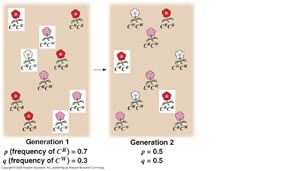
Genetics, meiosis
Study Questions: - Also see the practice problems on the syllabus.....
1. Consider a population with p = q = 0.5, at HWE. Now, if there is positivie assortative mating, what will happen over time?
2. How does inbreeding differ from positive assortative mating?
3. What is genetic drift? Under what biological circumstances is it likely to occur?
4. Consider this population : p = 0.3 q = 0.7
Suppose immigrants come to this population with p = 0.9
and q = 0.1, and the immigrants make up 20% on the new population. What
are the new gene frequencies after one generation of migration?
6. Consider a population in which p = 0.2 and q = 0.8.
Suppose 'a' mutates to 'A' at a rate of 3 x 10-4. What are the new
gene frequencies in the next generation?
7. Why is relative fitness more important than fitness?
8. Consider the following population of zygotes:
AA Aa aa
Genotypic Frequency 0.3 0.3 0.4
Prob. of survival 0.4
0.2
0.1
a. What are the initial gene frequencies?
b. Is the population in HWE?
c. What are the relative fitness values?
d. What are the genotypic frequencies in the population of reproductive adults?
e. What are the gene frequencies in the population of reproductive adults?
f. If there is random mating, what will be the genotypic frequencies in the next generation?
g. What agent of evolutionary change is at work?
9. Outline the modern synthetic theory of evolution.
10. List the three components of fitness, and explain two trade-offs that necessarily occur because of limited energy budgets.
11. Why can't selection perfect an organism? Describe in terms of contradictory selective pressures, and provide an example.
12. Outline The Modern Synthetic Theory of Evolution, listing sources of variation and agents of change.
13. What is peripatric speciation?
14. Why would small populations in new environments evolve more rapidly than large populations in their "old" habitat? (two reasons, related to agents of change.)
15. Given the answer the question 2, describe Eldgridge and Gould's conclusions rearding the effects of these changes on the fossil record. - Why are complete sequences of intermediates rare?
16. What is "evo-devo"?